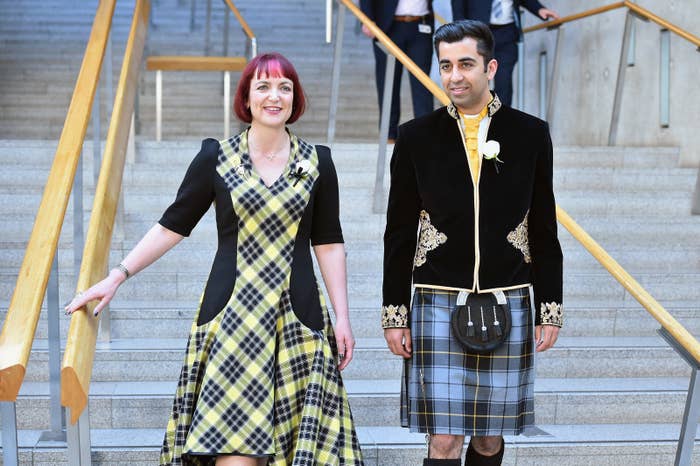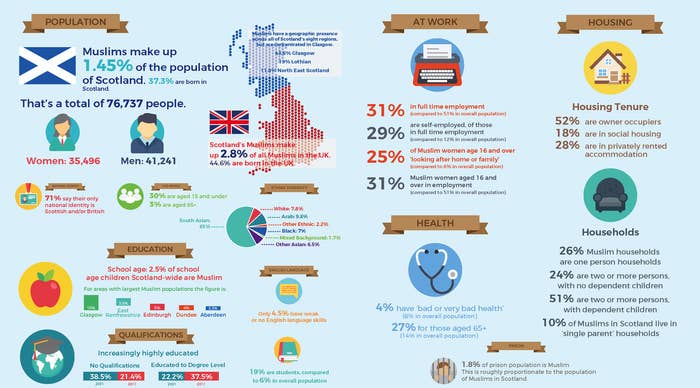
Scotland's Muslims are younger and more likely to be in higher education or self-employed than the country's overall population, according to analysis of official data.
Around 38% of Scottish Muslims are educated to degree level or above, up from 22% a decade ago, compared with 3 in 10 of the overall population of Scotland.
One in three are likely to be "economically active" full-time, whether as an employee or self-employed. In contrast, 19.8% of Muslims in England and Wales are in full-time work.
Edinburgh University's Scottish Muslims in Numbers study, published on Tuesday, shows also that the group is an entrepreneurial one: Of those in full-time work, 30% are self-employed, compared with around 12% of the overall population.
Researchers said the figures show that Scottish Muslims are an aspirational population and socioeconomically better off than Muslims in England and Wales.
"The tendency towards self-reliance, along with high student figures are indicative of an aspirational population that is seeking upward social mobility," the report said.
Scottish Muslims also feel a strong sense of belonging to Scotland, with 71% stating their only national identity as Scottish or British. Around 37% of Muslims in Scotland were born in Scotland, with just under 45% born elsewhere in the UK.
In recent years, Scottish Muslim politicians have received much public attention: Tasmina Ahmed-Sheikh was elected as the SNP's first Muslim MP at the last general election, while earlier this year Humza Yousaf, the Scottish minister for transport, famously delivered his oath in the Scottish parliament in Urdu while wearing a kilt. Both have been cited as role models for young Scottish Muslims.
The analysis, which aims to provide a comprehensive picture of Muslim demographics in Scotland, is the first of its kind in the nation. It was made possible because 93% of respondents completed a voluntary question on religion in the 2011 census.
"As Scotland’s sense of itself continues to develop in this new and evolving political context, its appreciation of its minority populations is vital to its evolving self-understanding," the report noted.
In 2011, there were 77,000 Muslims living in Scotland, up from 43,000 in 2001 – an 80% increase. However, the group is still a small minority of the overall Scottish population at around 1 in 70, and makes up 2.8% of all Muslims in the UK.

"While at 1.45% Muslims constitute only a small minority of Scotland’s population, they remain the largest religious minority, larger than all other religious minorities combined," the report said.
Scottish Muslims are also a youthful population with 30% aged 15 or under in 2011, compared to 17% overall, which may help explain figures that show 1 in 5 are students, compared with 6% of the general population, researchers said.
The study also found that Muslims are widely dispersed across the nation, with the highest concentration (5%) in Glasgow. The report challenged the "popularised notion" that British Muslims are self-segregating, as analysis reveals there is a Muslim presence even in the most remote of Scottish regions.
"Moreover, even the areas with the most concentrated Muslim populations do not come close to comparing to some of the wards in the North of England," the report said.
The report also noted a number of issues for government and policymakers to consider in relation with Scotland’s growing Muslim population, and said understanding the demographic and its health, education, and socioeconomic features is crucial.

Dr Khadijah Elshayyal, who led the study, said: "Our report encompasses numerous aspects of life for Muslims in Scotland. Its findings will form the basis of a wider project that aims to encourage conversations, at a national and local level, concerning the present and future needs of Scotland's growing Muslim population."
Researchers highlighted that a quarter of Muslim women look after the home and family, compared with 5.6 per cent of all Scottish women.
The report pointed to the younger age profile of the Muslim population and higher number of dependent children than the general population as factors to explain the lower figures for "economic activity" among Muslim women.
Other important factors relate to employment barriers, whether linked to discrimination or a lack of more flexible, nontraditional channels of
employment that could help mothers to enter or rejoin the workforce, the report said.
Analysis also revealed a challenge for policymakers in that a disproportionately high number of elderly Muslim women have self-reported bad or very bad health – one-third, compared with 14% overall. As a result, the report recommends policymakers and community groups extend health education and awareness campaigns.
The report also highlights that less than 4.5% of the Muslim population have weak or no English language skills – compared with an estimated 6% of Muslims in England and Wales.
Researchers, however, noted that the data is already five years old and does not reflect changes and developments that have taken place since 2011 – such as the recent and continuing arrival of Syrian refugees.
